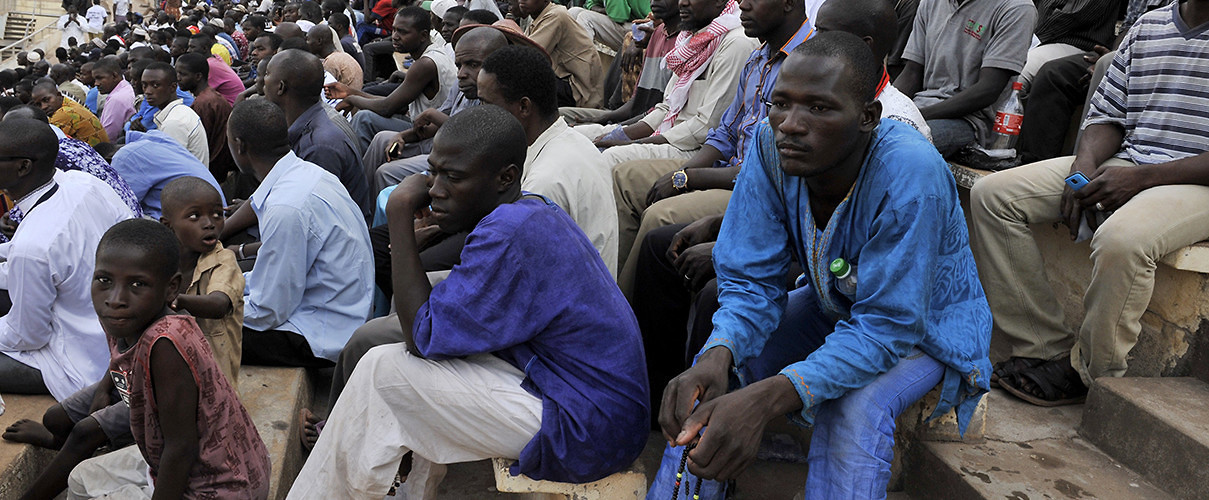Malians attend a gathering calling for peace in the north of the country after clashes between the government and Tuareg rebels. Bamako, Mali, May 2, 2015. (Habibou Kouyate/AFP/Getty Images)
The government of Mali and the rebel Coordination of Azawad Movements (CMA) coalition signed peace accords on June 20. The deal attempts to end a crisis sparked three years ago, which is linked to decades old grievances in the north of the West African country. Much ink has been spilled regarding the likelihood of these agreements holding, with skeptics highlighting continued instability in the country and the fact that a number of rebel groups remain outside the formal peace process.
Among this rush of commentary, relatively little attention has been paid to the near simultaneous announcement of a new “stability” initiative for the troubled region. With previous failed peace accords throughout Mali’s history typically being accompanied by halting and ineffective development and stability programs, could this new effort provide a better chance for delivering long-term improvements and lasting peace?
The stability program was put forth by Prime Minister Modibo Keita and focuses on the “safety of people and goods, improving living conditions, and pushing for justice,” though the details of how these objectives will be achieved remain unclear. The initiative received broad support in the Malian parliament, with 116 votes in favor and just 16 in opposition. There was, however, some notable opposition, including from prominent northern politician Soumaila Cisse, who criticized what he saw as the “inaccuracies” included in the suggested program, likely regarding the socioeconomic conditions and political coalitions in the north. Cisse is a respected economist and participated in a broad anti-coup coalition during the 2012 military overthrow of the government in Bamako. His opposition to the stability initiative alludes not only to the geographical political divisions in the country, but also suggests the government’s latest policy is not economically sound or politically feasible.
Details concerning the new program are difficult to come by. The lack of newspaper coverage, public debate, or local consultation suggest that this new initiative might repeat mistakes of the past, relying on lofty rhetoric, without delivering tangible development outcomes. Nonetheless, its formation reflects the fact that many of the Tuareg grievances with Mali’s government are linked to the economic and political marginalization of the region; Mali’s north is characterized by an inhospitable climate, low population density, and limited opportunities for employment beyond incorporation into the increasingly influential illicit trade networks traversing the broader Sahel region of Africa. While the country’s overall development profile remains dire, the few economic activities that exist in the country are concentrated in the country’s south. The three northern regions that comprise 2/3 of the country’s territory contributed just 9.5% of national GDP in 2012 .
The inability to properly address these concerns has often been seen as a sticking point for progress on past peace accords. These include the Tamanrasset Accords signed under former president Moussa Traore in 1991 to address a Tuareg rebellion in 1990. Under the terms of the agreement the north would have remained a part of Mali, though the current administrators were to be replaced with local representatives and the region would have been granted more autonomy. Traore’s Decentralization Mission, formed in late 1992, and implemendted under Alpha Oumar Konare oversaw the creation of new administrative boundaries and the creation of sub-national units with some taxation authority, responsible for health, education, and limited infrastructure projects. However, the endemic poverty throughout the north presented few economic opportunities for former militants. Many of the former militants therefore integrated themselves into criminal smuggling networks.
The failure of these agreements and the decentralization mission laid the foundation for continued rebellions by Tuaregs and other aggrieved northern populations, including a minor uprising shortly after the turn of the millennium. Noting the destabilizing effects of the north’s underdevelopment, then president Amadou Toumani Toure implemented the Special Program for Peace and Development of Regions of Northern Mali (PSPDN) in 2011, with a budget of $69 million and significant international support, in an effort to “ensure safety and enable local people to carry out development activities.”
Even in the nascent stages of implementation, the PSPDN proved controversial to the local populations; Tuaregs protested that a significant proportion of the funding was used to build military barracks and remilitarize the north. After stoking tensions between the Tuareg rebels and the government, the “rhetoric of security and development” faded and few of the promised development projects were enacted.
A 2013 review by RAND Corporation of the Malian government’s development initiatives in the north found that much of the aid earmarked for the region had never reached its destination because of “corruption or plain bad faith.” The report said the fact that the aid that did not make it to the intended region had become not only a major source of income for the region but also a vehicle for individuals and groups to elevate their political and social status relative to others, which had altered the region’s sociopolitical structures. This failure to economically and politically incorporate the north facilitated the Salafist-Tuareg alliance; in 2012, when Toure was overthrown in a military coup, this coalition declared an independent Azawad.
The latest government stability program serves as an opportunity to display a genuine commitment to addressing the grievances of northern populations. If improperly implemented, however, it could also serve as fodder for anti-government actors seeking to derail the already frail peace process. The signing of the peace accords between the CMA and the Malian government offers promise but cannot erase the decades of mistrust between northern populations and Bamako. As the RAND report points out, much rests on the willingness and ability of the government to share resources with the north and to bring more meaningful development to the region.
Hilary Matfess is a researcher at the Center for Complex Operations at the National Defense University, Washington, DC.





